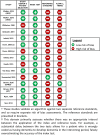The validity of dementia diagnoses in routinely collected electronic health records in the United Kingdom: A systematic review
- PMID: 30667114
- PMCID: PMC6519035
- DOI: 10.1002/pds.4669
The validity of dementia diagnoses in routinely collected electronic health records in the United Kingdom: A systematic review
Abstract
Purpose: The purpose of the study is to assess the validity of codes or algorithms used to identify dementia in UK electronic health record (EHR) primary care and hospitalisation databases.
Methods: Relevant studies were identified by searching the MEDLINE/EMBASE databases from inception to June 2018, hand-searching reference lists, and consulting experts. The search strategy included synonyms for "Dementia", "Europe", and "EHR". Studies were included if they validated dementia diagnoses in UK primary care or hospitalisation databases, irrespective of validation method used. The Quality Assessment for Diagnostic Accuracy Studies-2 (QUADAS-2) tool was used to assess risk of bias.
Results: From 1469 unique records, 14 relevant studies were included. Thirteen validated individual diagnoses against a reference standard, reporting high estimates of validity. Most reported only the positive predictive value (PPV), with estimates ranging between 0.09 and 1.0 and 0.62 and 0.85 in primary care and hospitalisation databases, respectively. One study performed a rate comparison, indicating good generalisability of dementia diagnoses in The Health Improvement Network (THIN) database to the UK population. Studies were of low methodological quality. As studies were not comparable, no summary validity estimates were produced.
Conclusion: While heterogenous across studies, reported validity estimates were generally high. However, the credibility of these estimates is limited by the methodological quality of studies, primarily resulting from insufficient blinding of researchers interpreting the reference test. Inadequate reporting, particularly of the specific codes validated, hindered comparison of estimates across studies. Future validation studies should make use of more robust reference tests, follow established reporting guidelines, and calculate all measures of validity.
Keywords: United Kingdom; dementia; diagnosis; electronic health records; pharmacoepidemiology; systematic review; validity.
© 2019 The Authors. Pharmacoepidemiology & Drug Safety Published by John Wiley & Sons Ltd.
Conflict of interest statement
The authors declare no conflict of interest.
Figures




Similar articles
-
Folic acid supplementation and malaria susceptibility and severity among people taking antifolate antimalarial drugs in endemic areas.Cochrane Database Syst Rev. 2022 Feb 1;2(2022):CD014217. doi: 10.1002/14651858.CD014217. Cochrane Database Syst Rev. 2022. PMID: 36321557 Free PMC article.
-
Accuracy of pneumonia hospital admissions in a primary care electronic medical record database.Pharmacoepidemiol Drug Saf. 2012 Jun;21(6):659-65. doi: 10.1002/pds.3207. Epub 2012 Feb 28. Pharmacoepidemiol Drug Saf. 2012. PMID: 22374684 Free PMC article. Clinical Trial.
-
Validity and completeness of colorectal cancer diagnoses in a primary care database in the United Kingdom.Pharmacoepidemiol Drug Saf. 2016 Apr;25(4):385-91. doi: 10.1002/pds.3877. Epub 2015 Oct 5. Pharmacoepidemiol Drug Saf. 2016. PMID: 26436320 Free PMC article.
-
The identification and validity of congenital malformation diagnoses in UK electronic health records: A systematic review.Pharmacoepidemiol Drug Saf. 2021 Jul;30(7):875-898. doi: 10.1002/pds.5251. Epub 2021 May 4. Pharmacoepidemiol Drug Saf. 2021. PMID: 33881794
-
Validating the 8 CPCSSN case definitions for chronic disease surveillance in a primary care database of electronic health records.Ann Fam Med. 2014 Jul;12(4):367-72. doi: 10.1370/afm.1644. Ann Fam Med. 2014. PMID: 25024246 Free PMC article.
Cited by
-
Validity of Acute Cardiovascular Outcome Diagnoses Recorded in European Electronic Health Records: A Systematic Review.Clin Epidemiol. 2020 Oct 14;12:1095-1111. doi: 10.2147/CLEP.S265619. eCollection 2020. Clin Epidemiol. 2020. PMID: 33116903 Free PMC article. Review.
-
Time Trends in Incidence of Reported Memory Concerns and Cognitive Decline: A Cohort Study in UK Primary Care.Clin Epidemiol. 2022 Mar 24;14:395-408. doi: 10.2147/CLEP.S350396. eCollection 2022. Clin Epidemiol. 2022. PMID: 35359800 Free PMC article.
-
Incidence of cognitive impairment and dementia after hospitalisation for pneumonia: a UK population-based matched cohort study.ERJ Open Res. 2023 May 9;9(3):00328-2022. doi: 10.1183/23120541.00328-2022. eCollection 2023 May. ERJ Open Res. 2023. PMID: 37228284 Free PMC article.
-
Association of blood pressure variability during acute care hospitalization and incident dementia.Front Neurol. 2023 Feb 7;14:1085885. doi: 10.3389/fneur.2023.1085885. eCollection 2023. Front Neurol. 2023. PMID: 36824417 Free PMC article.
-
Trends in the incidence of dementia in people with hypertension in the UK 2000 to 2021.Alzheimers Dement (Amst). 2023 Jul 30;15(3):e12466. doi: 10.1002/dad2.12466. eCollection 2023 Jul-Sep. Alzheimers Dement (Amst). 2023. PMID: 37529121 Free PMC article.
References
Publication types
MeSH terms
Grants and funding
LinkOut - more resources
Full Text Sources
Medical
Research Materials

